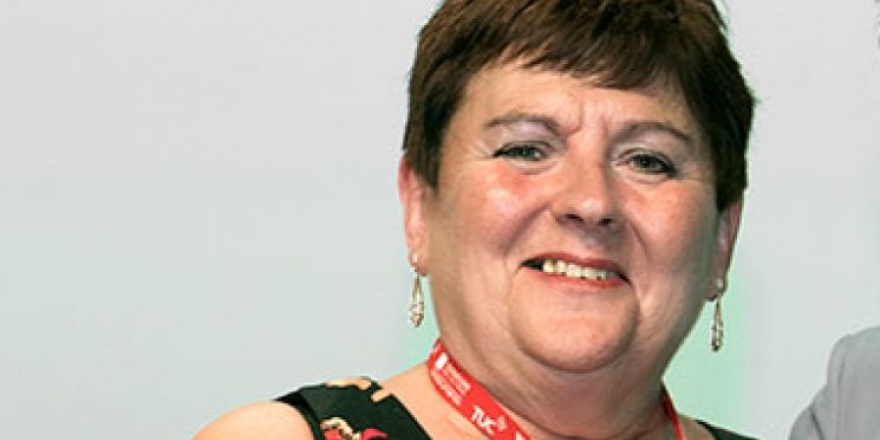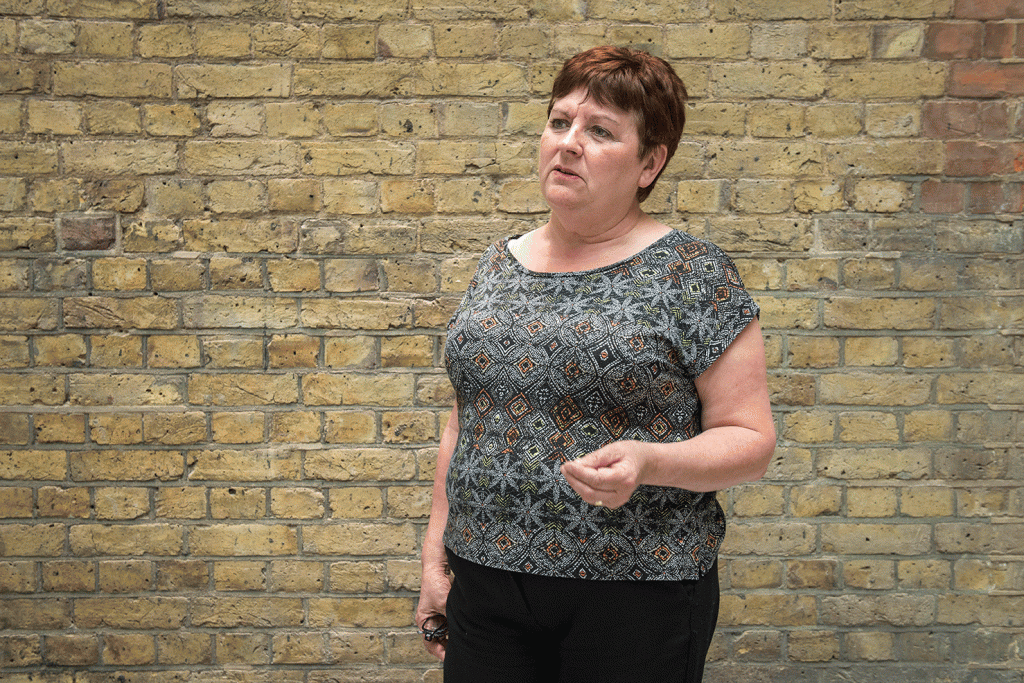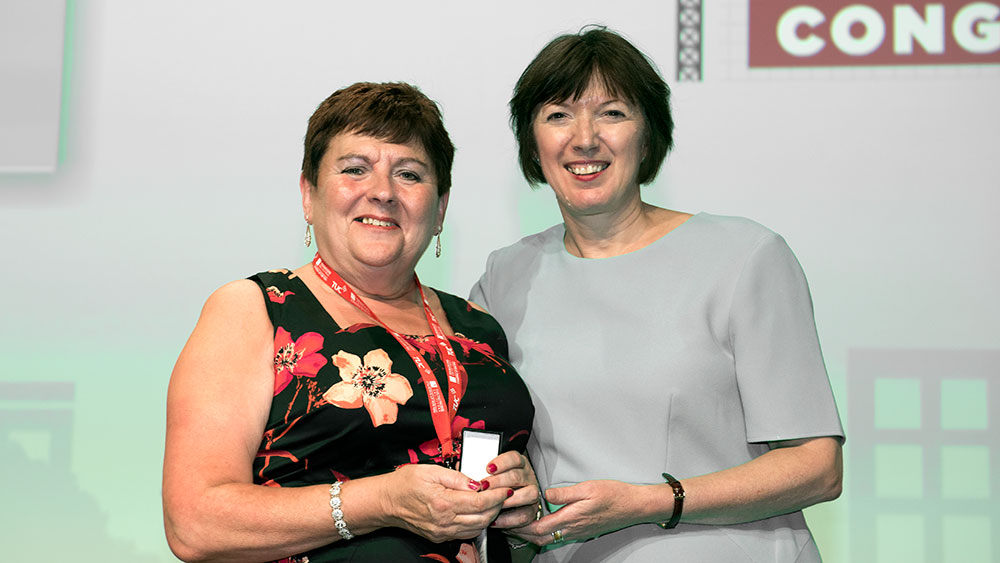
A life less ordinary

A young survivor of domestic violence was Margaret McKee’s first disciplinary case as a union rep. What happened with that case influenced the course of her union activity, indeed her whole life, and ultimately led to her being awarded the prestigious TUC Women’s Gold Badge this summer.
So who is Margaret McKee, and what did she do to deserve the Gold Badge?
Margaret has been a catering assistant at the Royal Victoria Hospital in Belfast for 37 years. On the day of her first disciplinary hearing as a rep, she was walking to the meeting with her young colleague.
The woman was about to face a panel including her manager, who was putting the case against her for frequent lateness. She was on her final warning.
As they walked, the woman opened up to Margaret, telling her that her husband had been violent and that she had finally asked him to leave the house. But now she had to work two jobs to earn enough money to take care of her children.
She was working in the hospital from 7am until 2pm, and then working for a taxi firm from 5pm until 2am. She was late because she was looking after her children, and she was exhausted.
“Would you allow me to tell the panel this?” Margaret asked. The woman agreed.

Margaret went in first and spoke to the panel. By the time the hearing began the panel had switched from being about to interrogate the woman to advising her manager on how best she could be supported.
They changed her hours to allow her to keep her job and start later, to fit in with her children’s school hours.
Or as Margaret puts it in her soft Northern Irish accent, “We got a change of hours for the wee girl.”
It’s not surprising her colleague opened up to her – she’s warm and friendly and has a way of making you feel at ease. She’s achieved an incredible amount, but has a tendency to give the credit to other people.
It’s also no surprise that it was the TUC women’s award that she won. From the very beginning, for Margaret being involved in a trade union has been about standing up for women’s rights.
Before Margaret was active in the union, one of the cooks at Royal Victoria Hospital, a man, was Margaret’s union rep.
They were in a meeting with managers when talk turned to “conditional overtime“, payment for overtime or time off sick. The cooks – all men – received it. The catering assistants – all women – had never heard of it – even though they frequently worked over their contracted hours.
When Margaret asked what it was they told her not to be stupid, that she knew what it was.
Margaret said to them: “I don’t get it, none of the kitchen assistants get it, and I’m going to put in for it.” She put in a claim, and won two years’ worth of conditional overtime.
That was when she realised that someone needed to look out for the women’s interests too, and became a union rep herself.
“My mama used to say: when poverty comes in the door, love goes out the window”
After representing the woman in the disciplinary, Margaret set out to do more to support people experiencing domestic violence.
Through UNISON’s women’s committee, she met people working in a different hospital that had a domestic violence policy, and she used that to get one implemented in her own hospital.
A policy that sought to protect women – “and men of course, it’s not just women” Margaret reminds me – experiencing domestic abuse, with provisions such as making sure they have paid time off for issues relation to violence, such as seeing a doctor or solicitor, and granting them an advance on their wages if they’ve left home.
But then she went one step further – “What’s the point in having a policy if it’s just lying in a drawer?” – and founded a scheme to train domestic abuse support workers.
They are people in the workplace, often union reps, who are trained to support people experiencing domestic violence and can discretely ensure the relevant elements of the policy are implemented.
Clearly the type of person who gets things done, Margaret is a trained domestic abuse support worker herself, and she meets up with all the others several times a year.
Each case is confidential, of course, but they discuss how many cases they have had and Margaret thinks domestic violence is on the rise.
“My mama used to say ‘when poverty comes in the door, love goes out the window’ and I think it’s all down to the austerity cuts.
“People’s living standards are getting poorer. The poor people are getting poorer, the rich people are getting richer, and the impact of it is that more women are being assaulted by their husbands.”

Whether poverty is the reason or not, according to the Police Service of Northern Ireland the number of domestic abuse crimes and incidents reported is at its highest level since 2004, when statistics were first collected. The police respond to a domestic incident in Northern Ireland every 19 minutes.
The work Margaret is doing is needed now more than ever, and that is only part of what she’s doing. It seems that when Margaret sees a social problem, she gets stuck in trying to fix it.
One of those issues is helping female prisoners in Northern Ireland.
There isn’t a women’s prison in Northern Ireland, Margaret says, it was shut down years ago, which means female prisoners are kept in a male young offenders institute.
Margaret is a joint leader of UNISON’s regional Women in Prisons Project, a unique scheme that supports marginalised women, including trafficked women, who have been pushed into the Northern Ireland prison system.
The project offers training for the prisoners on women’s health, history and confidence skills, to help them when they leave prison. She does this training three or four times per year and says that the women frequently open up to her.
“I would say 80 to 85% of the women that we met had serious mental health problems – they were heavily medicated, they suffered from bipolar, paranoia, some of them had serious problems with drugs and weren’t getting the help that they should have been getting to take them off drugs.
“And some of them suffered really bad sexual and violent abuse.”
It’s another example of people opening up to Margaret because of her warm nature, but she also has a tough side.
Put her in a room full of managers and she’s in her element: “I get a buzz out of fighting for people’s rights. I love it.”
Margaret says she feels nervous being interviewed on camera, but put her in a room full of managers and she’s in her element: “I get a buzz out of fighting for people’s rights. I love it.”
While she’s doing a huge amount to help her community, Margaret is distressed by the challenges they’re facing. Where she lives in Belfast is one of the most socially deprived areas in Europe.
Unemployment is extremely high, and so is suicide. Margaret is involved in a suicide prevention project because she’s deeply worried about the future of her community, and she blames unemployment.
“We’ve lost a whole generation. The Good Friday Agreement and the peace agreement – there’s a whole generation of kids who were supposed to benefit from them but they didn’t.”
Unemployment is causing young people to turn to suicide and drugs, she says, and Margaret counts her own son as one of the lost generation.
“My son was murdered, and it was due to drugs. My son was one of that generation, who should have benefited from the Good Friday Agreement, and they didn’t.”
Margaret apologises for having tears in her eyes.
What does she think should be done to help the younger generation in Northern Ireland and the rest of the UK?
“I think resources should be put into the proper places: education, proper housing, jobs for people, proper wages.”
Talking to her, you get the feeling that if she were in charge of the UK these issues probably would have been sorted already. But at least we have her in UNISON.


